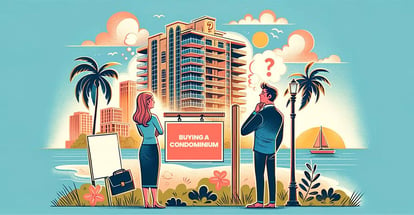How To Invest In Mixed-Use Property in Florida
For seasoned real estate investors, this presents an intriguing opportunity in the Florida market. If you're curious to delve deeper into the world of mixed-use real estate in the Sunshine State, this article will provide you with comprehensive insights.
Table of Contents
- What Is A Mixed-Use Property in Florida?
- Types Of Mixed-Use Property in Florida
- The Importance Of Mixed-Use Zoning in Florida
- How To Find Mixed-Use Property For Sale in Florida
- The Pros And Cons Of Mixed-Use Property in Florida
- A Simplified Guide to Mixed Use Property Requirements by Loan Type
- FAQs About Mixed-Use Property in Florida
What Is A Mixed-Use Property in Florida?
In Florida, a mixed-use property refers to a unique real estate investment that brings together commercial, residential, and occasionally industrial units within a single development.
This innovative concept enables investors to leverage diverse property types in a single investment venture.
In the Sunshine State, you'll find mixed-use developments that offer a seamless blend of complementary establishments.
For instance, you might come across a mixed-use complex featuring a hotel alongside retail stores and a gym.
Alternatively, you could find an apartment community conveniently situated within walking distance of enticing restaurants and local businesses.
Residents of these mixed-use developments in Florida enjoy added convenience as they may reduce or eliminate their reliance on owning a car, given the accessibility to various amenities and services.
From an investor's standpoint, such multi-use properties often demonstrate better long-term performance and yield higher returns, making them an attractive opportunity in Florida's real estate market.

Types Of Mixed-Use Property in Florida
In Florida, the world of mixed-use properties offers a diverse array of options for investors. Here are four main types of mixed-use property that you'll commonly encounter in the Sunshine State:
Main Street
The Main Street space combines residential and commercial units in the heart of a town or city center. This setup often features residential units on the upper floors and commercial spaces on the ground floor.
Main Street developments have a rich history and have stood the test of time as a classic example of mixed-use real estate in Florida.
Live/Work
In a Live/Work space, tenants reside and operate their businesses within the same building. This could entail having a business establishment on the ground floor with apartments located on the upper floors.
Alternatively, it might involve business partners living adjacent to their workspace, creating a seamless integration of life and work in Florida.
Residential And Office
The Residential and Office space is a fusion of office and residential units within the same building.
It primarily serves as a commercial building with multifamily residential units coexisting side by side, offering an interesting blend of work and living environments in Florida.
Mixed-Use Hotels
Mixed-Use Hotels in Florida typically encompass a combination of a hotel, fitness center, retail area, and various food and entertainment outlets.
Embracing the mixed-use concept in the hotel industry can enhance foot traffic and contribute to increased profitability for hotel businesses.
Investing in any of these mixed-use property types can present exciting opportunities in Florida's real estate landscape, catering to diverse needs and preferences while creating dynamic and vibrant spaces.
The Importance Of Mixed-Use Zoning in Florida
In Florida, the significance of mixed-use zoning, also known as mixed-use planning, cannot be overstated.
This approach has facilitated a seamless integration of diverse property types within the same development, contributing to vibrant and efficient urban spaces.
There are three primary categories of mixed-use zoning developments commonly found in the Sunshine State:
Horizontal Developments
Horizontal developments in Florida encompass a variety of single-use properties thoughtfully combined to serve complementary functions.
For instance, you may encounter a mix of apartments, businesses, and retail stores conveniently located within the same block. This integration allows for enhanced convenience and accessibility for residents and visitors alike.
Vertical Developments
Vertical developments in Florida feature different types of properties within a single building, optimizing the efficient use of space and resources.
For example, you might find retail stores occupying the lower levels of a building, while apartments are situated on the top floors.
This vertical arrangement fosters a dynamic environment where people can live, work, and shop within close proximity.
Walkable Developments
Walkable developments in Florida represent a fusion of both horizontal and vertical planning elements, creating pedestrian-friendly neighborhoods that encourage people to walk and explore their surroundings.
These developments often combine various property types, fostering a sense of community and connectivity.
By embracing mixed-use zoning, Florida has harnessed the potential of combining different functions and property types in strategic ways, leading to more efficient land utilization, improved urban mobility, and a heightened quality of life for its residents.
How To Find Mixed-Use Property For Sale in Florida
In Florida, discovering mixed-use properties for sale can be a rewarding endeavor for investors. Here are some effective strategies to find these properties:
Market Listings
The most direct method is to search through available market listings.
Utilize online real estate platforms, local real estate agents, and property listing websites to identify mixed-use properties that are publicly listed for sale in Florida.
Off-Market Listings
Consider exploring off-market listings, which are properties not publicly advertised. This approach may require more patience, but it opens up a larger pool of potential real estate opportunities.
Networking with real estate professionals, attending industry events, and engaging in word-of-mouth inquiries can lead to discovering off-market mixed-use properties.
Online Resources
Leverage online sites and platforms that offer a comprehensive search for both on and off-market listings in Florida.
These platforms often provide valuable tools and filters to refine your search and find properties that match your investment criteria.
By employing these strategic methods, you can uncover enticing mixed-use property opportunities in Florida, potentially bypassing unnecessary fees and gaining access to a wider range of investment prospects.
The Pros And Cons Of Mixed-Use Property in Florida
As with any investment strategy, mixed-use developments in Florida offer a set of advantages and disadvantages that investors should carefully consider.
Let's explore the main pros and cons specific to Florida's mixed-use properties.
Pros
-
Diverse Tenant Market - Investing in mixed-use property in Florida attracts a more diverse array of tenants, fostering vibrant and engaging communities that enhance the overall property value of the neighborhood.
-
Reduced Risk - Florida's high demand for mixed-use properties translates to a less risky investment. By diversifying your investment across multiple property types, you can mitigate potential losses if a tenant vacates.
-
Convenience - Mixed-use properties in Florida provide enhanced convenience to consumers due to their proximity to public transportation, shops, workplaces, and restaurants.
- Sustainable Real Estate - Florida's mixed-use developments contribute to a more sustainable way of living and working. Compact designs conserve land and natural resources, while improved walkability reduces pollution as residents rely less on their cars.
Cons
-
Complexity - Developing major mixed-use projects in Florida that include shopping centers, hotels, offices, and apartment buildings can be a complex and time-consuming process. Poorly planned developments may lead to conflicts between residents and store owners.
-
Management Challenges - Managing a mixed-use project in Florida can be even more challenging than planning it. Such projects may require multiple property managers to oversee different aspects of a single property.
-
Higher Upfront Costs - Investing in mixed-use properties in Florida can entail higher upfront costs. If these properties struggle to attract tenants and customers, potential profits could be limited.
- Financing and Loan Challenges - Finding suitable financing options for mixed-use developments in Florida might be more difficult, especially in smaller markets where lenders may be cautious.
By weighing these pros and cons, investors can make informed decisions when considering mixed-use property opportunities in Florida's dynamic real estate market.
A Simplified Guide to Mixed Use Property Requirements by Loan Type
Mixed-use properties refer to residential properties with a business component, such as space designated for day care facilities, beauty salons, or doctor's offices. The eligibility of these properties is typically determined based on appraisals and sales contracts.
When dealing with commercial or mixed-use space in a condominium project, it is essential to consult agency guidelines, as the allocation for business use may differ in such cases.
Different loan types have specific requirements for mixed-use properties. For instance, Fannie Mae mandates that the property must primarily be residential, with modifications that do not adversely affect its marketability.
Additionally, only one primary residential unit is allowed, and the borrower must both own and operate the business.
The location should be in a residential neighborhood, reflecting typical properties in the market area, and the mixed-use must align with local zoning regulations.
Freddie Mac also emphasizes the residential nature of the property, requiring that modifications should not impact its marketability.
For condominium projects, live-work units are permissible if residential use remains primary, and non-residential use is secondary.
In properties with 1-4 units, at least 51% of the building's square footage must be for residential use, and the commercial component must not compromise the safety and well-being of the occupants.
Additionally, live/work units in condo projects should not exceed 49% commercial / nonresidential space.
FHA, VA, and USDA guidelines share the focus on primarily residential use and the preservation of the residential character.
Each agency has specific requirements related to zoning, permitted uses, and restrictions on income-producing elements.
FHA's requirements include complying with local zoning regulations, while VA stresses legal compliance with zoning or acceptance of non-conforming use by local authorities.
USDA, on the other hand, restricts buildings primarily used for income production, though minor income-generating activities are permitted, provided they don't undermine the property's residential nature.
Home-based operations with limited commercial features are typically allowed across all loan types, as long as they don't interfere with the property's residential character.
FAQs About Mixed-Use Property in Florida
What's the difference between a mixed-use property and a mixed-commercial property in Florida?
In Florida, a mixed-use property is intentionally utilized for a variety of purposes, encompassing commercial, residential, retail, office, or parking space within the same development.
For instance, if a property includes an apartment complex, retail stores, and businesses within the same area, it qualifies as a mixed-use property.
On the other hand, a mixed-commercial property in Florida involves different types of commercial properties coexisting within the same area.
This could entail a blend of office, industrial, and retail stores located within the property.
What are the benefits of mixed-use properties in Florida?
Investing in mixed-use developments in Florida offers numerous advantages. The diverse property types complement each other, providing more options and convenience for nearby tenants.
Mixed-use properties often foster a stronger sense of community among residents, enhancing the overall living experience.
As an investor, your returns are likely to be higher with a mixed-use property in Florida.
Due to the high demand for such neighborhoods, you can charge more in rent, and commercial tenants are motivated to maintain the property to ensure the success of their businesses.
What is an example of a mixed-use property in Florida?
An example of a mixed-use property in Florida could be a single building that accommodates various commercial and residential spaces.
For instance, the lower levels could house restaurants, stores, and office spaces, while the upper levels feature apartment buildings or condominiums.
How do you manage a mixed-use property in Florida?
Managing a mixed-use property in Florida requires attention to various aspects. After the initial setup and investment, the hard work involves finding suitable tenants and efficiently managing the property.
To ensure effective management, it's crucial to hire experienced property managers in Florida who are well-versed in dealing with both residential and commercial tenants.
Familiarizing yourself with local regulations and zoning laws is essential to avoid potential problems and ensure compliance with all requirements.
With over 50 years of mortgage industry experience, we are here to help you achieve the American dream of owning a home. We strive to provide the best education before, during, and after you buy a home. Our advice is based on experience with Phil Ganz and Team closing over One billion dollars and helping countless families.

About Author - Phil Ganz
Phil Ganz has over 20+ years of experience in the residential financing space. With over a billion dollars of funded loans, Phil helps homebuyers configure the perfect mortgage plan. Whether it's your first home, a complex multiple-property purchase, or anything in between, Phil has the experience to help you achieve your goals.


 By
By  Edited by
Edited by 






